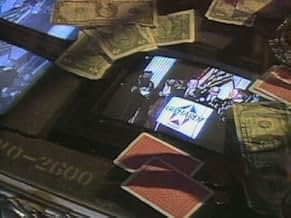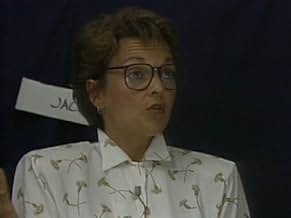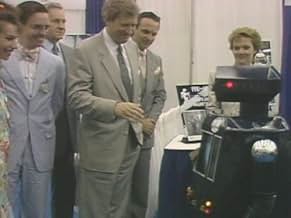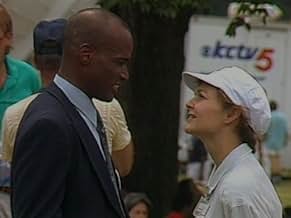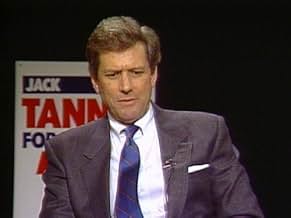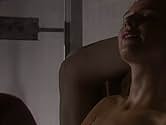Ajouter une intrigue dans votre langueA behind-the-scenes look at a former Michigan U.S. Representative's campaign as he vies for his party's Presidential nomination.A behind-the-scenes look at a former Michigan U.S. Representative's campaign as he vies for his party's Presidential nomination.A behind-the-scenes look at a former Michigan U.S. Representative's campaign as he vies for his party's Presidential nomination.
- Récompensé par 1 Primetime Emmy
- 4 victoires et 3 nominations au total
Avis à la une
This one is as brilliant, funny and thought-provoking as the best of the writer and director's solo projects. All the performances are terrific -- Pamela Reed, in particular, shows why she's one of the most interesting American actresses working today.
Which is interesting since it sometimes has that long feeling of an Altman shot here and there, or one that is held for longer than one might expect in a TV show; one crucial shot being when Jack Tanner (Michael Murphy) is shot unawares by a camera looking through a glass coffee table as he gives a passionate monologue to his campaign team after a bad day. Shots like these, or when two characters have a conversation for a stretch of time (i.e. Tanner and the governor Bruce Babbit talking along the Potomac) should be self-conscious, but they aren't. And other times the trademark Altmanesque approach to shooting is actually spot-on for a kind of soap opera quality to the proceedings that ends up lending itself to comedy more than the melodramatic moment of revelation. It's a great moment of comedy, for example, not merely in the look between Stringer (Daniel Kincaid) and Joanna Buckley (Wendy Crewson) as he knows it's Dukakis's campaign manager who's been sleeping around with Tanner, and likewise she knows he knows, but how the shot goes, a quick zoom in on each other's eyes, as if the audience didn't know- which of course we do- and the light touch of theme music in the background.
Tanner '88 is also great entertainment as far as being able to expect "For Real" reality, to quote an episode, as Tanner encounters real politicians, for the most part not knowing that it's a fictional show (Pat Robertson, for example). We know how this will all end, but the question of the how and when is what strikes up drama and madness in equal measure, as if even in the most predictable means it adds to the appeal (new campaign supervisors on how to speak more forcefully and with strict attention, then the scandal(s), awkward campaign stops, a not-quite assassination attempt as one of the funniest asides, dissension from reporters). And touches of irony help along the way, like how Veronica Cartwright's reporter, who at first is not getting much of the scoop, and how she soon acquires the fired former camerman on Tanner's inner circle (let go for an uproariously stupid montage video on drug legalization, taken mostly from Tanner's notebook) who shoots like many a pretentious reality-TV cameraman- and then also reports first on the affair scandal to boot! I also liked how Kitty Dukakis got figured into the actual storyline, as opposed to just another throwaway political figure.
And all the while Murphy is a total pro- robbed of an Emmy severely in fact- and there ends up being more for him to do as an actor, in playing a sympathetic but flawed character who as TJ describes about his running for president is like a "lifestyle choice." Pamela Reed, Cynthia Nixon and Ilana Levine make up the principle female characters, all with their own pragmatic, optimistic, and just frustrated views on the campaign trail, and they're great to have in the midst of an otherwise predominantly male cast. It's important that they too are right on the ball with Murphy at just saying the right things when diverting from Trudau's script. Suddenly it doesn't feel like we're simply seeing a fictional account of a debate between Tanner, Jesse and Dukakis, but it's more immediate than that. Even more-so than Primary Colors we're given a first-hand look at the process, the ugliness and dirty side, the idiots and mistakes made consistently, the cynicism and irony, and how the media and politics are inseparable and insufferable depending on the beat. And it has the immediacy of news while keeping a hold on the multi-dimensional framework that Altman mastered in his career.
Taken as a whole work it is very long, but worth every moment of extra characterization, and ever extra song performance of the theme (my favorite was the hair metal version at the fundraiser in Los Angeles), and it's one of the most insightful, amusing, and superlative works from a quintessential American director.
The premise is creative, and Jack Tanner and TJ Cavanaugh are great characters. Everyone else though is either forgettable or immensely unlikeable. Deke, Molly, and Andrea are perhaps the most annoying. Deke, the cameraman, always manages to be creepy and shove cameras in people's faces for avant-garde documentary footage. The news reporter Molly shows up ready to fly off the handle over not getting a good story. While Andrea, a Tanner campaign employee, does toughen up, she never looses that underlying whiny naivety that makes you wonder how she wound up working for a political campaign in the first place.
In addition, the plot lines of episodes don't seem all that focused. They will usually pick up with the aftermath of what the last episode closed with and then move to something else, with the aftermath being dealt with in the following episode. It seems like each episode contained two halves of a different story. The end of the former episode and the beginning of the latter should have all just been one episode.
And yet, Tanner '88 seems to have moments that pull you back in when you've gotten annoyed with it. There's the speech at the end of the first episode (which may be the best episode), the cameos with other candidates and notable figures, and numerous scenes where TJ, always the commanding workaholic, is deftly managing a difficult campaign.
By no means is this a bad show. However, I definitely expected more from it, especially considering that this was an inspiration to the superior political drama: The West Wing.
Inspiring and clarifying, it makes one wonder first of all why it's always the wrong movie people that get elected in politics. Wouldn't we all be much more relaxed if USA politics had a bit of the Altman-touch to it...
Unfortunately, the inspiration of this Maverick doesn't seem to reach the oligarchy in power. Altman DOES show us that TV can be fascinating and uplifting, even though he got curtailed, which will keep us wondering how that 12th episode that was never shot would be like.
Does this TV-series, which is over before one knows it and doesn't seem to take the 12x 30 minutes it says on the DVD jewelbox, draw a true picture of political USA ? Being from Europe I sincerely hope not, but I'm afraid it is even worse than Tanner is showing us. 'Let's not tell too much and focus on the face'.
And even worse, after globalization and sugarfrosted horrors for breakfast, the 'old world' is quickly picking up on this terrible excrescence too...
The humor of this work is bone dry; its central criticism of the campaign process as being concerned with mere appearances rings louder today. Tanner is a great satirical character-it's never really answered why he is running for president because at the end of the day the answer is probably vanity. Like most Altman works this has the ensemble and multiple plotlines aspects where is feels like you are looking into a group of lives. Tanner is the central focus but a half a dozen or so stories are present. I especially liked the ongoing drama with TJ (campaign manager) and Ted Kennedy.
In a lot of ways this touches on Altman's central concerns and sensibilities. It is a cross section of both America and wide range of people-most episodes are literally in different states and there a dozens of people in this work. It has the great unresolved quality of so much Altman. The series ends on a plot cliffhanger while feeling complete as a commentary. It has the disappointment in and cynicism of American politics. It has the musical interludes. The direction is very much the fly on the wall free flowing camera Altman does so well.
I think people who aren't use to Altman's style or want a quick feel of his body of work would do well to start with this. Because this is episodic it is more accessible than Nashville. Altman wasn't wrong to think of this as his most creative work-it has the controlled chaos that defines the best parts of his work.
Le saviez-vous
- AnecdotesAaron Sorkin has acknowledged that this miniseries had an influence on À la Maison Blanche (1999), which he created, in its underlying idealism, and in its view of political staffers as people who at least struggle to do the right thing.
- Citations
[making a toast at his son's wedding rehearsal dinner]
Tanner's Father: One hundred years ago, William Gladstone, after a particularly acrimonious debate in Parliament, bellowed across the floor at his arch-rival Benjamin Disraeli, "You, sir," he said, "will one day end your days on the gallows or of venereal disease." Disraeli raised himself up and replied, "That, sir, would depend on whether I embrace your principles or your mistress."
Alex Tanner: Grandpa.
Tanner's Father: I tell this humorous story because it hasn't been altogether clear to me this past year exactly what my son is embracing.
Jack Tanner: Dad!
[Jack's fiancee gets up from the table and leaves]
- Versions alternativesAs a prelude to the first screening of the sequel _"Tanner on Tanner" (2004) (mini)_, the original mini-series was shown again on the Sundance Channel (in the US) and BBC 4 (in the UK). The re-release was subtitled "Once More in '04", and each episode was preceded by a newly filmed introduction, in which one of the main characters talks to camera about their memories of the '88 campaign, 16 years on.
- ConnexionsFeatured in Siskel & Ebert Holiday Video Gift Guide (1992)
Meilleurs choix
- How many seasons does Tanner '88 have?Alimenté par Alexa
Détails
Contribuer à cette page


